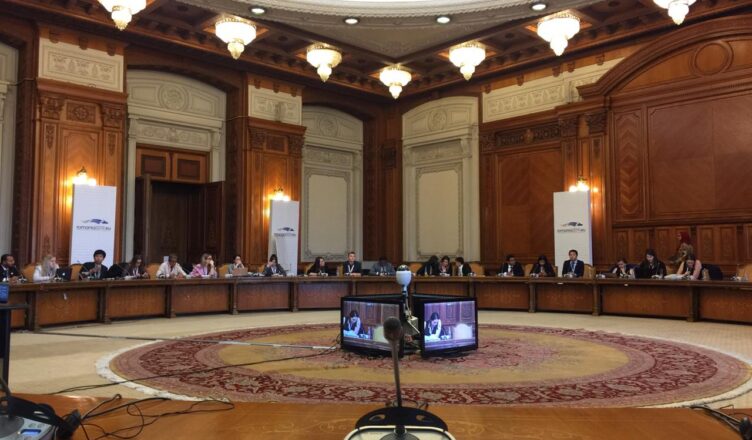by ALINA ROINITA
Last week, between 11-15 May, most education leaders from Europe and Asia gathered in Bucharest, Romania, for the 7th ASEF Rectors’ Conference and Students’ Forum (ARC7). This conference was organized by Asia-Europe Foundation (ASEF) together with National University of Political Studies and Public Administration (SNSPA) and the Romanian Ministry of Education. Other educational institutions also were partners of the conference, such as European University Association, International Association of Universities, European Students’ Union, etc.
I had the honor to represent Romania among 51 student leaders from 51 countries. The topics we discussed referred to the development of higher education at local, regional and international levels in close relation with the goals of sustainable development adopted in 2015 by the United Nations. What did a conference led by ASEF look like? It resembled ideal training, in which all 51 students had two months of pre-training with several webinars, group assignments, but also individual ones, all meant to build awareness and prepare for the conference debates. More than this, all the participants had the chance to meet important education representatives, senior officials, and education ministers from the 51 ASEF partner countries.
Why was this conference so important? First of all, because Agenda 2030 is a global goal and, in this respect, universities represent an important factor to achieve this goal. Second, because sharing so many different opinions helps us understand the many different realities around us, which bring up the same needs. It is important to be aware of everyone’s reality, to be curious about others and about all the opportunities they might offer for a better life. Needless to say, all of us might be part of Agenda 2030 and, individually, everyone can take action for a better quality of life even if we do feel like others should take action on this and solve our problems. Meeting so many different people from so many different cultures, and seeing them fighting for the same goals as mine was such a unique feeling! There were fewer borders between us, a universal peace, an atmosphere of mutual well-being and prosperity. This is how our goals should look from now on!
After the introduction regarding What Higher Education Can Do for SDGs, and after many debates among senior officials on the topic, the 51 student leaders started working in group sessions. There were three major groups: (WG1) Taking Action at Home – SDGs as Core Pillars of University Governance, (WG2) Taking Action at Community Level – SDGs as Drivers of University Social Impact, (WG3) Taking Action at International Level – SDGs as a Catalyst to Reorient Internationalisation. I won’t discuss all the recommendations from each group, as they will be accesible online (asef.org). But I am going to give some personal insights from my work experience in WG3. My topic was related to internationalisation, which was supposed to be easy to discuss and debate given that we were in an international forum. Definitely, discussing how to universally explain things in the final recommendation wasn’t an easy thing to do! Differing views and backgrounds brought to the table different problems of each society. But the first things we agreed on was bringing people together through students’ mobilities. In this respect, universities should be involved in more international exchange programs interconnected amongst students, researchers, and staff. The processes should be less bureaucratic and more inclusive. The power of the international mobility is amazing! People are becoming more connected, they are more aware of the steps everyone takes, and they are starting to take greater action.
Another recommendation we made was to promote virtual collaboration through an international online platform to facilitate cooperation between higher education institutions and the online application process for international mobility. We live in a digital era. Nobody can deny all the advantages of this virtual world. Let’s make it even better! I remember my colleagues and I personally had difficult times choosing how to express our feelings regarding people in need and how we should encourage universities to take action on them. The universities and the governments should unite to advocate for these vulnerable people and provide them multilateral support in order to guarantee equal access to international higher education. Universities are the key to achieving this goal. Moreover, we need some standardised Academic Credit System and language courses to facilitate the process of international mobility. Our idea of quality education through internalisation has come to an end and its principles refer to cohesion, solidarity, and equal opportunity. The access to quality education should be part of everyone’s life.
In the end, we handed the recommendations to the ministers of education with very high hopes. I have to express my gratitude to the ASEF team and all the partners who made this possible. I strongly believe in higher education as a key to achieve all the SDGs, and I strongly believe in everyone’s power of making a difference in this world. This planet needs us as well as our fellowship. Experimental education and culture are the keys to bringing understanding back to local communities and spread a better vision of life to the world.
Photo credit: Alina Roiniță

